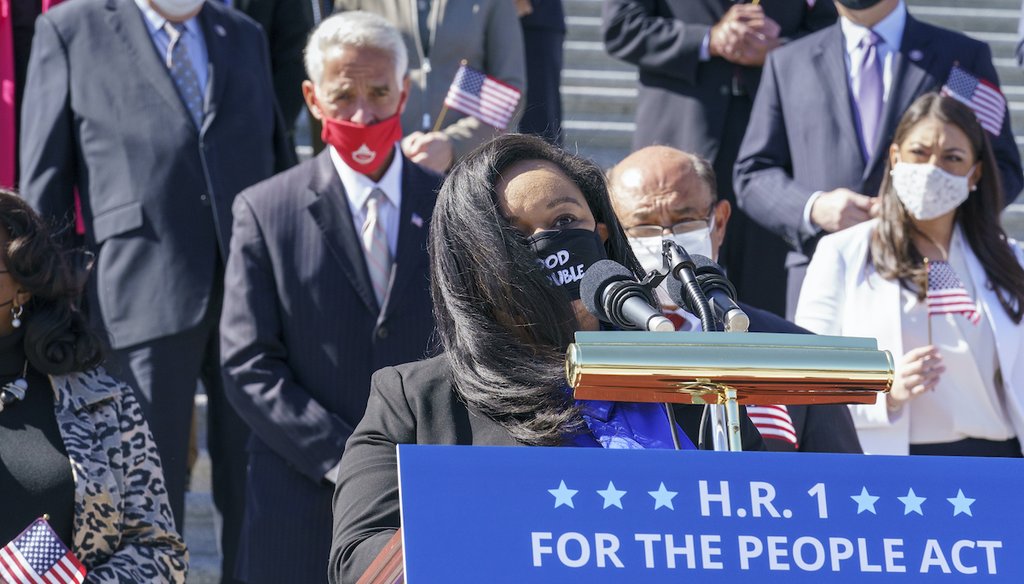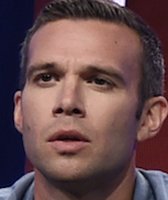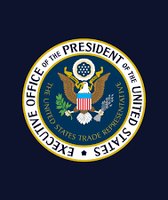Stand up for the facts!
Our only agenda is to publish the truth so you can be an informed participant in democracy.
We need your help.
I would like to contribute

Rep. Nikema Williams, D-Ga, recalls the legacy of Rep. John Lewis as Democrats gather to address reporters on H.R. 1, the For the People Act of 2021, at the Capitol in Washington, Wednesday, March 3, 2021. (AP)
If Your Time is short
-
H.R. 1 combines proposals for voter registration, absentee voting, in-person voting, campaign finance and ethics related to federal elections. The House passed the bill March 3 and it now goes to the Senate.
-
The bill would ease the process of voting by mail for those who want to use it, by lifting state rules that can require an excuse to vote absentee. But the bill would allow in-person voting to continue, too.
-
One section of H.R. 1 details rules that states must follow for removing ineligible voters, including notifying registrants.
Opponents of a voting rights bill would have you believe that the legislation will allow murderers, teenagers, welfare recipients and immigrants in the country illegally to vote en masse — and that every American will now only cast ballots by mail. These attacks on the legislation are rife with misinformation.
Known as the For the People Act, the 791-page H.R. 1 combines proposals for voter registration, absentee voting, in-person voting, campaign finance and ethics related to federal elections. The House passed the bill March 3 largely along party lines, with Democrats in favor Republicans opposed. It now goes to the Senate.
The future impact of some provisions of the bill, such as whether campaign finance provisions would limit free speech of certain donors, are a subject of debate. But attacks on some of the sections about voting are false or omit important context.
H.R. 1 "would force states to adopt universal mail-in ballots." — Former Vice President Mike Pence
This is False.
Several states currently conduct elections almost entirely by mail, sending ballots automatically to every registered voter. But H.R. 1 would not force every state to conduct elections this way.
Sign up for PolitiFact texts
Rather, the bill would ease the process of voting by mail for those who want to use it, by lifting rules that require an excuse to vote absentee. It would not require anyone to stop using either early in-person voting or in-person voting on Election Day.
H.R. 1 would mean "that millions of illegal immigrants are quickly registered to vote." — Pence
This rates False.
The bill does not permit voting by noncitizens in U.S. elections, whether they’re in the country legally or not. Pence was referring to a provision that would require automatic voter registration for people using services at government agencies. But that section says government agencies would pass along a person’s information for voter registration only if they are citizens. People would still be attesting that they are eligible to vote, with penalties for lying, and it would still be up to election officials to verify eligibility. The goal of the bill is to register eligible citizens. Pence’s warning that "millions" of ineligible noncitizens would be quickly added to the rolls is unsupported.
Help shape our fact-checking! Take PolitiFact’s reader survey now >>
H.R. 1 "would force states to restore the voting rights of convicted felons—including violent felons convicted of murder or rape." — U.S. Rep. Doug LaMalfa, R-Calif.
This is Half True.
The proposed legislation would restore voting rights for all people convicted of a crime once they’ve been released from incarceration. LaMalfa ignores the fact that the vast majority of states, including California, already restore voting rights for people convicted of a felony, either automatically upon their release or after a period of time.
H.R. 1 "automatically registers every welfare recipient to vote." — Former President Donald Trump
This is Mostly False.
H.R. 1 includes an automatic voter registration provision under which government agencies, including those that provide public assistance, would pass along to election officials information about people who are eligible to vote.
But Trump’s statement creates a misleading impression that people on welfare will have a special path to voter registration, regardless of eligibility. The legislation says that government offices that help people with other services, such as veterans or gun owners, would also get the same assistance in registering to vote. Under the bill, applicants could opt out, and election officials will still review applications for eligibility requirements before moving them to the voter rolls.
H.R. 1 would "prevent removal of ineligible voters from registration rolls." — U.S. Rep. Elise Stefanik, R-N.Y.
This rates False.
No section of the bill prevents an election official from removing an ineligible person on the voting rolls. One section of H.R. 1 details rules that states must follow for removing ineligible voters, including that they must notify the registrants.
H.R. 1 will allow members of Congress to draw a second salary "worth an estimated $600,000 per year!"— Act for America, a conservative political group
This is False. We found nothing in the legislation that would allow members of Congress to earn a second salary. There is a provision that allows non-incumbent candidates to use campaign funds to pay for expenses such as child care so that they are able to run for office.
H.R. 1 does not change an existing policy that allows candidates to draw a salary of up to $174,000 from campaign funds. That policy doesn’t apply to those who are already in Congress.
H.R. 1 provides for a "16-year-old voter age" — Act for America
This is wrong. The bill says that states must accept an individual’s application to register to vote if the individual is at least 16 years old. However, it also states that nothing in that provision "may be construed to require a state to permit an individual who is under 18 years of age at the time of an election for federal office to vote in the election."
This process is known as "preregistration" and is already allowed in some states for individuals who are 16 or 17. Some states also permit 17-year-olds to vote in primary elections, if they will turn 18 before the general election.
The House rejected a proposed amendment to lower the voting age to 16.
PolitiFact senior correspondent Louis Jacobson and CAP radio reporter Chris Nichols contributed to this story.
RELATED: Yes, the ACLU has criticized HR 1. Here’s why
RELATED: Fact-checking misleading attacks on HR 1, Democrats’ voting rights bill
Our Sources
Congress.gov, H.R.1 - For the People Act of 2021, Introduced Jan. 4, 2021
NPR, Some Noncitizens Do Wind Up Registered To Vote, But Usually Not On Purpose, Feb. 26, 2019
AP, Pennsylvania finds 544 possibly illegal ballots since 2000, Oct. 25, 2017
CNN, Fact check: Pence echoes Trump's Big Lie in dishonest op-ed on election rules, March 3, 2021
Bipartisan Policy Center, Can H.R. 1 Improve Voter Registration? March 2, 2021
Campaign Legal Center, The Bipartisan Origins & Impact of the For the People Act (H.R. 1/S. 1) Jan. 25, 2021
Campaign Legal Center, For a More Accessible, Transparent and Responsive Government, CLC’s Trevor Potter Encourages Congress to Pass the "For the People Act," Jan. 4, 2021
Campaign Legal Center, How H.R. 1 Will Help Us Achieve a Government for the People, Jan. 4, 2021
Brennan Center for Justice at NYU, Annotated Guide to the For the People Act of 2021, Jan. 20, 2021
R Street, A Primer on H.R. 1, the "For the People Act of 2021" March 1, 2021
Heritage Foundation, Statement to PolitiFact, March 4, 2021
Email interview, Danielle Lang, Co-Director, Voting Rights & Redistricting, March 4, 2021
Email interview, Matthew Weil, director of the elections project at the Bipartisan Policy Center, March 4, 2021
Email interview, David J. Becker, Center for Election Innovation & Research executive director and founder, March 4, 2021
Email interview, Dan Weiner, deputy director of the Brennan Center's Election Reform Program,, March 4, 2021






































